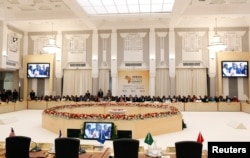Several of the G-20 group of industrialized countries are failing to take action in line with their pledges to reduce emissions, made under the 2015 Paris Climate Agreement, according to new research. Scientists fear the momentum behind reducing emissions could be lost if U.S. President-elect Donald Trump follows through on campaign pledges to pull out of the deal.
Six G-20 countries, the Untied States, Argentina, Australia, Canada, Saudi Arabia and Turkey, are failing to enact sufficient legislation to meet their emissions targets, according to Professor Samuel Fankhauser, who was part of the research team at the London School of Economics’ Grantham Research Institute on Climate Change and the Environment.
“Are there policy frameworks? Are there laws? Are there incentives that make emissions come down in due course? We have in the United States for example, there is the Clean Power Plan, but that is a sectorial (not comprehensive) plan, there is not a country-wide target that covers all emissions,” he said.
The report is being launched on the sidelines of the global climate meeting in Marrakech, Morocco. Delegates there aim to put policy detail on the Paris agreement, which seeks to limit global warming to two degrees Celsius above pre-industrial levels.
“Paris Agreement has been ratified by 110 countries. And it is a fragile compromise, so there is potential for internal infighting to start again amongst those 110 countries. But there is momentum that is quite stable. Countries know in which direction they have to go but they also understand that it is in their self-interest,” said Fankhauser.
That momentum could be slowed by the next U.S. president, Donald Trump, who, during the campaign, pledged to withdraw from the Paris agreement.
In Marrakech, delegates from across the world have issued appeals for Washington to stick to its commitments, among them Botswana President Ian Khama.
"No current or incoming administrations should attempt to undo our collective will as people of the world to do what is overdue to make our planet a better place and guarantee the continued existence of all life on it," he said.
Climate scientists say under the Obama administration, the United States has been ahead of the curve. Kelly Stone of ActionAid USA spoke to VOA via Skype from the Marrakech conference.
“The Obama administration released a plan yesterday that set a goal of an 80 percent net emissions reduction by 2050, from 2005 levels. And so that is ambitious, it is more ambitious than what we have seen from the United States before, but it is not nearly ambitious enough,” she said.
Britain is the latest country to ratify the Paris climate agreement. Climate campaigners hope U.S. allies can persuade Trump to keep the U.S. signature on the deal.






